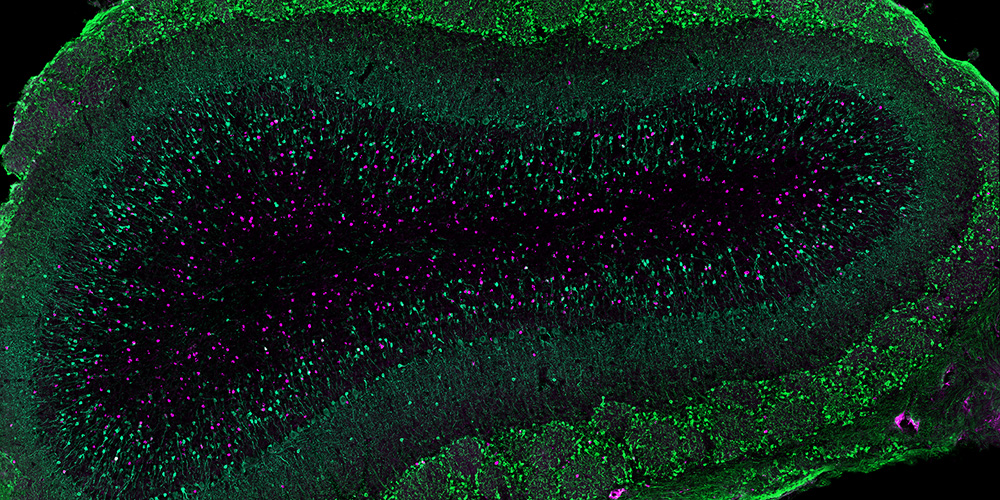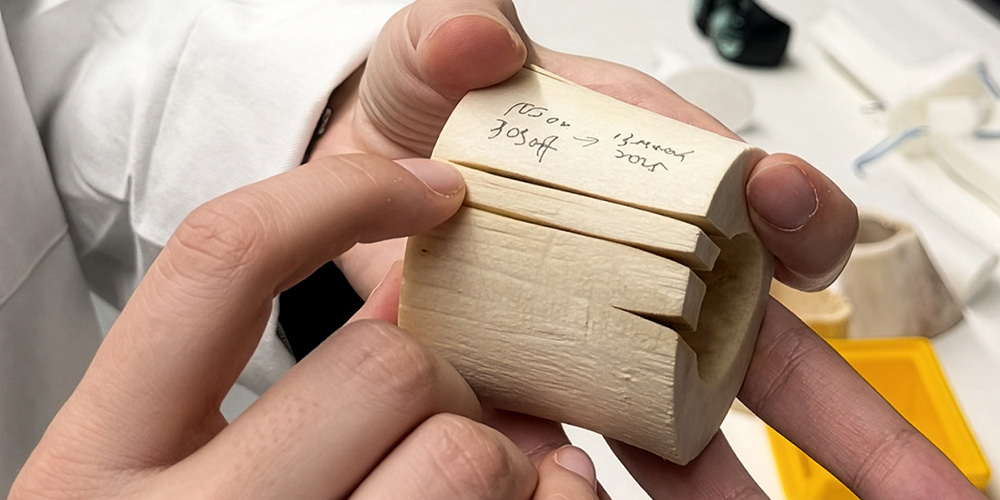Pregnancy remodels the brain: stem cells shape the sense of smell in mothers
Pregnancy and motherhood lead to brain remodeling. A research team at the University of Basel has now discovered through experiments with mice that distinct pools of stem cells in the adult brain are turned on during pregnancy. They give rise to specific types of olfactory bulb neurons, the team reports in “Science”.
23 November 2023 | Heike Sacher, Katrin Bühler
In the animal kingdom, recognizing their offspring by smell ensures parents can nurture their own young. The research group led by Professor Fiona Doetsch at the Biozentrum, University of Basel, has now demonstrated in mice that new neurons are temporarily formed in the olfactory bulb of the brain just for this specific purpose. They develop during pregnancy and disappear a few weeks after birth. These new neurons in the mother’s brain enable her to recognize her own pups.
What is the origin of these new neurons? Stem cells are immature cells found in certain regions in the adult brain. Doetsch’s group is investigating stem cells in the so-called ventricular-subventricular zone in the adult mouse brain, which give rise to neurons that migrate to the olfactory bulb. Their previous work has shown that some of these stem cells are activated by stimuli, such as hunger and satiety, to generate specific neuron types. However, whether other states recruit different stem cell pools was not known.
In their new study, recently published in "Science", the researchers show that in mice, pregnancy results in the synchronized activation of distinct pools of stem cells, many of which are usually dormant. This leads to the formation of otherwise rarer types of neurons that are temporarily added to the olfactory bulb, the part of the brain which processes information about smell, around the time of birth. These neurons ensure that mothers can recognize their own pups during early motherhood.
Altered olfaction for pup recognition
These new neurons have an important role. They make the sense of smell in mothers more sensitized for pup recognition. In humans, stem cells are also present in the same brain area, although they normally do not make olfactory bulb neurons after early infancy.
“Some women report changes in smell during pregnancy," says first author Dr. Zayna Chaker. “A similar process may also occur in humans with dormant stem cells being turned on in response to pregnancy.”
Perfect timing for parenthood
During gestation, different stem cell pools in the mother are stimulated at different times to generate temporary waves of neurons. Their migration to the olfactory bulb and maturation coincides with the end of pregnancy. "The timing is precise. The new neurons are ready right in time for birth," says Doetsch. "However, they are only temporarily needed and are eliminated when pups are older and independent". The transient recruitment of stem cells in pregnant females therefore prepares the brain for specific needs in anticipation of motherhood.
In future studies, Doetsch’s team wants to investigate which signals trigger transient stem cell recruitment and neurogenesis during pregnancy. It is also still unclear why and how the newly generated neurons are removed from the olfactory bulb, and raise the question of whether soon-to be fathers experience similar remodeling of the brain.
Neurogenesis important for adult brain plasticity
These on-demand adaptations of the brain underscore that brain plasticity is not only based on modifying synaptic connections between resident neurons. The dynamic and selective recruitment of distinct pools of adult neural stem cells to form specific neuron subtypes may play a key role in the brain’s ability to respond to diverse life experiences.
Original publication
Zayna Chaker, Corina Segalada, Jonas A. Kretz, Ilhan E. Acar, Ana C. Delgado, Valerie Crotet, Andreas E. Moor and Fiona Doetsch.
Pregnancy-responsive pools of adult neural stem cells for transient neurogenesis in mothers.
Science (2023), doi: 10.1126/science.abo5199



